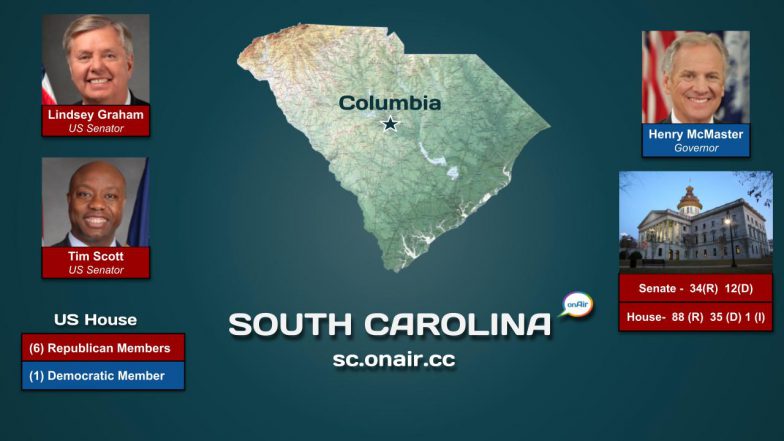Summary
South Carolina is located in the Southern region of the USA with Columbia as its capital. Henry McMaster (R) is Governor.
The South Carolina legislature has 46 Senate members and 124 House members.
OnAir Post: South Carolina onAir
News
The base content in each post in this South Carolina onAironAir Hub has been updated as of 12/20/23. In addition to the eight posts on the home page, in depth posts on each US House member and posts on South Carolina onAir government and elections have been started. These posts have been shared with the US onAir Hub and will updated in the US onAir automatically when they are updated in this hub.
If your university or nonpartisan organization (such as a government focused research center, citizen engagement program or a League of Women Voters chapter) is interested in assisting the US onAir network to help curate new issue posts or other posts on this Hub and moderate the forums in each post, contact Ben Murphy at Ben.Murphy@onair.cc.
We are also supporting college students to start an onAir chapter on the their campus to coordinate the curation and moderation of posts especially on state and local representatives and government.
About
The South Carolina onAir Hub supports South Carolinians to become more informed about and engaged in local, state, and federal politics while facilitating more civil and positive discussions with their representatives, candidates, and fellow citizens.
- South Carolina onAir is one of 50 state governance and elections hubs that the US onAir Network is providing to help reinvigorate US democracy. This post has short summaries of current state and federal representatives with links to their complete Hub posts. Students curate post content from government, campaign, social media, and public websites. Key content on the South CarolinaHub is also replicated on the US onAir nations Hub at: us.onair.cc.
- South Carolina students will be forming onAir chapters in their colleges and universities to help curate Hub content. As more students participate and more onAir chapters are started, we will expand to include more state and local content as well as increase the number of aircasts – student-led, livestreamed, online discussions with candidates, representatives, and the public.
Find out more about Who Represents Me inSouth Carolina
Learn more about the US onAir Network
All hub content in onAir hubs is free to the public. Hub ontent is under the Creative Commons Attribution-NonCommercial license which permits content sharing and adaptation by nonprofit organizations as long as proper attribution is given to its author(s) and is used for non-commercial purposes. Content and moderation guidelines reinforce our commitment to fact-based, comprehensive content and civil and honest discourse.
To participate in aircast and post discussions, email usdemocracy@onair.cc and include your first name last name, and zipcode. Your real name and any other profile information will not be displayed unless you choose to do so. Your personal information is not shared with any other website or organization.
Hub membership will enable you to:
- Participate in issue and interview aircasts (student-led livestreamed discussions);
- Interact directly with post authors and curators giving them feedback, content suggestions, and asking questions;
- Ask questions, make suggestions, and give endorsement to representatives
Web Links
State Representatives
| Office | Name | Party | Assumed office | Next election | Term limited | Maximum term length | |
|---|---|---|---|---|---|---|---|
| Governor | Henry McMaster | Republican | January 24, 2017 | 2022 | No | Two consecutive terms | |
| Lieutenant Governor* | Pamela Evette | Republican | January 9, 2019 | 2022 | No | Two consecutive terms | |
| Secretary of State | Mark Hammond | Republican | January 15, 2003 | 2022 | No | No limits | |
| Attorney General | Alan Wilson | Republican | January 12, 2011 | 2022 | No | No limits | |
| Treasurer | Curtis Loftis | Republican | January 12, 2011 | 2022 | No | No limits | |
| Comptroller General | Richard Eckstrom | Republican | January 15, 2003 | 2022 | No | No limits | |
| Commissioner of Agriculture | Hugh Weathers | Republican | September 14, 2004 | 2022 | No | No limits | |
| Superintendent of Education | Molly Spearman | Republican | January 14, 2015 | 2022 | No (retiring) | No limits | |
Governor Henry McMaster
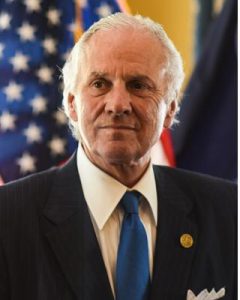 Current Position: US Senator since 2018
Current Position: US Senator since 2018
Affiliation: Republican
Candidate: 2022 Governor
Former Positions: Lt. Governor from 2015 – 2017; Attorney General from 2003 – 2011; United States Attorney for the District of South Carolina from 1981 – 1985
McMaster worked for U.S. senator Strom Thurmond, both in private practice and as a federal prosecutor. Appointed United States attorney for the District of South Carolina by President Ronald Reagan in 1981, he gained attention for investigating South Carolina marijuana smugglers in Operation Jackpot.
Featured Quote:
I’m proud to sign on to an amicus brief, led by @henrymcmaster, urging the Supreme Court to overturn Roe v. Wade & restore the authority of states to protect the lives of unborn children. #alpolitics
OnAir Post: Henry McMaster – SC
US Representatives
Senator Lindsey Graham
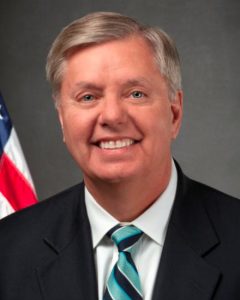 Current Position: US Senator since 2003
Current Position: US Senator since 2003
Affiliation: Republican
Former Positions: US Representative from 1995 – 2003; State Delegate from 1993 – 1995
Other Positions: Chair, Subcommittee on the Department of State, Foreign Operations, and Related Programs – Committee on Appropriations; Ranking Member, Committee on the Budget
From 1982 to 1988, when he served with the Judge Advocate General’s Corps in the United States Air Force, as a defense attorney and then as the Air Force’s chief prosecutor in Europe, based in West Germany. Graham worked as a lawyer in private practice before serving one term in the South Carolina House of Representatives from 1993 to 1995.
Graham sought the Republican nomination for president between June and December 2015, dropping out before the 2016 Republican primaries began. He was an outspoken critic of Donald Trump’s 2016 candidacy and repeatedly said he did not support Trump.
Featured Quote:
I hope the Biden Administration will let the Taliban know American air power will be available to the Afghan military without time restrictions. If not, we have very dangerous days ahead for the USA and Afghan women as we reach 20th anniversary of 9/11.
OnAir Post: Lindsey Graham – SC
Senator Tim Scott
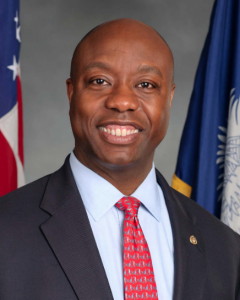 Current Position: US Senator since 2013
Current Position: US Senator since 2013
Affiliation: Republican
Former Positions: US Representative from 2011 – 2013; State Delegate from 2009 – 2011; Charleston County Council from 1995 – 2009
Tim Scott served as a city councilor in Charleston, South Carolina. He was a candidate for the Republican 2024 presidential nomination. Scott worked in financial services before serving on the Charleston County Council from 1995 to 2009.
Upon graduating from college, Scott worked as an insurance agent and financial adviser, a stepping stone toward starting his insurance agency, Tim Scott Allstate. His professional accomplishments enabled him to purchase a home for his mother.
Featured Quote:
I voted no on #infrastructure a week ago because there was no legislative text. My mind hasn’t changed. There’s still no legislative text or explanation on how to pay for a $1T infrastructure plan.
OnAir Post: Tim Scott – SC
Nancy Mace SC-01
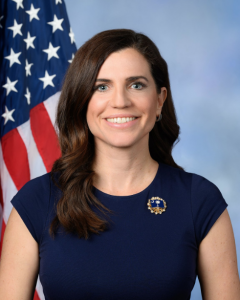 Current Position: US Representative of SC 1st District since 2021
Current Position: US Representative of SC 1st District since 2021
Affiliation: Republican
Former Position: State Delegate from 2018 – 2020
District: The district has historically been based in Charleston. On January 6, 2023, the district was declared unconstitutional on account of racial gerrymandering and would have to be redrawn April of that year.
Upcoming Election:
In 1999, Mace became the first woman to graduate from the Corps of Cadets program at The Citadel. In 2008, Mace started a public relations and consulting firm called The Mace Group. In 2012, Mace partnered with FITSNews, a news website that covers South Carolina politics and current events, to build their website.
Mace worked for Donald Trump’s 2016 presidential campaign, but strongly condemned his actions after the January 6 U.S. Capitol attack. Mace asserted that Trump’s legacy had been “wiped out” and that he should be held “accountable” for his actions; however, she ultimately voted against impeaching him.
Featured Quote:
We can disagree on things politically but this is not the way to handle disagreements. This is my home; my kids live here. I want to take a moment to thank everyone on both sides of the aisle for the outpouring of support we have received in response to this hateful attack.
OnAir Post: Nancy Mace SC-01
Joe Wilson SC-02
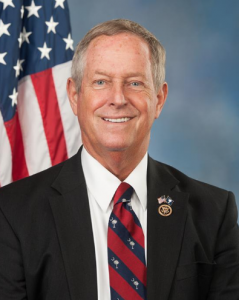 Current Position: US Representative of SC District 2 since 2001
Current Position: US Representative of SC District 2 since 2001
Affiliation: Republican
Former Position: State Senator from 1985 – 2001
District: The district spans from Columbia to the South Carolina side of the Augusta, Georgia metropolitan area
Upcoming Election:
Wilson is a member of the House Republican Policy Committee and an assistant Republican whip. In September 2009, Wilson interrupted a speech by U.S. President Barack Obama to a joint session of Congress, shouting, “You lie!
From 1972 to 1975, Wilson served in the United States Army Reserve. Thereafter, he was a Staff Judge Advocate in the South Carolina Army National Guard assigned to the 218th Mechanized Infantry Brigade until retiring from military service as a colonel in 2003.[9]
A real estate attorney, Wilson co-accounted the law firm Kirkland, Wilson, Moore, Taylor & Thomas in West Columbia, where he practiced for over 25 years. He was also a municipal judge in Springdale, South Carolina.
Featured Quote:
We cannot stand for China’s malign influence, human rights abuses, & dishonest behavior. As Chair of the @RepublicanStudyNat’l Sec & Foreign Affairs Task Force, I’m grateful to work with RSC Chair @RepJimBanks
on the toughest China legislation in years
OnAir Post: Joe Wilson SC-02
Jeff Duncan SC-03
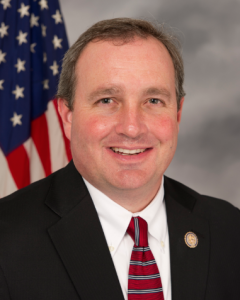 Current Position: US Representative of SC District 3 since 2011
Current Position: US Representative of SC District 3 since 2011
Affiliation: Republican
Former Position: State Delegate from 2003 – 2011
District: western South Carolina bordering both Georgia and North Carolina. It includes all of Abbeville, Anderson, Edgefield, Greenwood, Laurens, McCormick, Oconee, Pickens, and Saluda counties
Upcoming Election:
After graduation, Duncan served as branch manager and an assistant vice president during his seven years working in community banking. Later, he started his own small business, J. Duncan & Associates, a South Carolina-based, family-owned real estate marketing firm that specialized in statewide real estate auctions. He ran and operated that business until his election to Congress in 2010.
Featured Quote:
As former chairman of the Western Hemisphere Subcommittee on Foreign Affairs, my committee handled Cuba policy. Biden should make the US policy known we are with the Cuban people fighting for their God-given liberties & freedom from communist government. #SOSCuba #CubaLibre
OnAir Post: Jeff Duncan SC-03
William Timmons SC-04
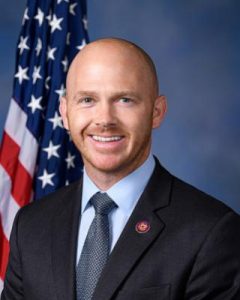 Current Position: US Representative of SC District 4 since 2019
Current Position: US Representative of SC District 4 since 2019
Affiliation: Republican
Former Position: State Senator from 2016 – 2018
Other Positions: Vice Ranking Member, Subcommittee on Oversight and Investigations – Committee on Financial Services; Vice Chair, Select Committee on the Modernization of Congress
District: upstate South Carolina bordering North Carolina. It includes parts of Greenville and Spartanburg counties.
Upcoming Election:
Timmons is a lifelong member of Christ Church in Greenville, and serves as a Captain in the South Carolina Air National Guard. Timmons owns Swamp Rabbit CrossFit and Soul Yoga, and previously operated the law firm Timmons & Company, LLC.
Timmons graduated from New York University in May 2021 with a Master of Science in Cybersecurity Risk and Strategy.
Featured Quote:
.@ModernizeCmte just passed our first recommendations for the 117th Congress. The 20 recommendations we advanced today will ensure the House is accessible to all Americans and is working to retain a talented and experienced workforce to make Congress more effective.
OnAir Post: William Timmons SC-04
Ralph Norman SC-05
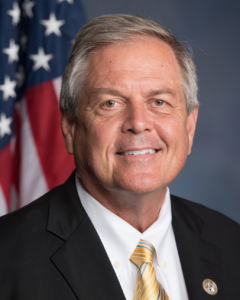 Current Position: US Representative of SC District 5 since 2017
Current Position: US Representative of SC District 5 since 2017
Affiliation: Republican
Former Position: State Delegate from 2009 – 2017
District: northern South Carolina bordering North Carolina. Outside the rapidly growing cities of Rock Hill, Fort Mill, and Lake Wylie the district is mostly rural and agricultural.
Upcoming Election:
With a net worth of $18.3 million, Norman is the 28th wealthiest member of Congress. He is a real estate developer at the Warren Norman Company, a business founded by and named after Norman’s father.
Govtrack.us ranked Norman as the most conservative member of the 117th Congress as of February 202
Featured Quote:
Even with the new Delta variant, COVID hospitalization rates for people who have been vaccinated is currently 0.003 percent. The Americans I know don’t cower in fear over risks that small.
OnAir Post: Ralph Norman SC-05
Jim Clyburn SC-06
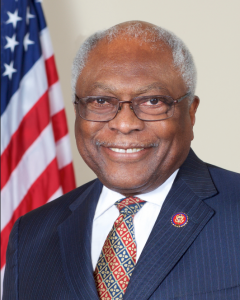 Current Position: US Representative of SC District 6 since 1993
Current Position: US Representative of SC District 6 since 1993
Affiliation: Democrat
District: all of Allendale, Bamberg, Calhoun, Clarendon, Hampton, and Williamsburg counties and parts of Charleston, Colleton, Dorchester, Florence, Jasper, Orangeburg, Richland and Sumter counties.
Upcoming Election:
Clyburn played a pivotal role in the 2020 presidential election by endorsing Joe Biden three days before the South Carolina Democratic primary. His endorsement came at a time when Biden’s campaign had suffered three disappointing finishes in the Iowa and Nevada caucuses and the New Hampshire primary. Biden’s South Carolina win three days before Super Tuesday transformed his campaign[citation needed]; the momentum led him to capture the Democratic nomination and later the presidency.
Featured Quote:
I am pleased the House passed the FY2022 Legislative Branch appropriations bill today which will remove symbols of white supremacy and hate throughout the Capitol and ensure our Congressional workforce reflects our great, diverse nation.
OnAir Post: Jim Clyburn SC-06
Russell Fry SC-07
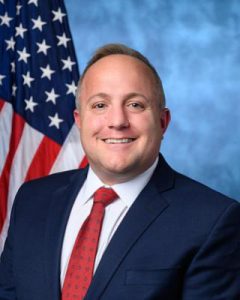 Current Position: US Representative of SC District 7 since 2023
Current Position: US Representative of SC District 7 since 2023
Affiliation: Republican
Previous Positions: Lawyer & SC House member from 2015 to 2023
District: Pee Dee region, and includes all of Chesterfield, Darlington, Dillon, Georgetown, Horry, Marion, and Marlboro Counties and most of Florence County.
Upcoming Election:
Fry was elected to serve as the president of the congressional freshman class during orientation week. On January 16, 2023, it was announced that Fry would serve on the House Judiciary Committee.
In 2018, he was appointed to the position of Majority Chief Whip for the 122nd South Carolina General Assembly.
OnAir Post: Russell Fry SC-07
More Information
Wikipedia
Contents
South Carolina government and politics cover the three different branches of government, as well as the state constitution, law enforcement agencies, federal representation, state finances, and state taxes. South Carolina is a state in the United States and was the eighth admitted to the Union. The state of South Carolina was preceded by the Crown Colony of South Carolina, a constitutional monarchy overthrown during the American Revolution. Presently, South Carolina’s government is formed as a representative democracy.
South Carolina is a largely conservative, Republican state. Since the Declaration of Independence, South Carolina’s politics have been controlled by three main parties: the Democratic-Republican Party in the early 1800s, the Democratic Party through most of the 19th and 20th centuries, and the Republican Party in the late 20th and early 21st centuries.
Like most Southern states, South Carolina consistently voted Democratic in the 19th century and much of the 20th century as a part of the Solid South. The Democratic block was largely maintained by the disenfranchisement of most black voters from 1865 to the passage of the Civil Rights Act of 1964. The Republican Party became competitive in the 1960 presidential election when Richard Nixon lost the state to John F. Kennedy by just two percentage points. In 1964, Barry Goldwater became the first Republican to win the state since Reconstruction.
Since the election of 1964, South Carolina has voted for the Republican party in every presidential election, with the exception of 1976 when Jimmy Carter, a southern Democrat, was elected president. However, in state-wide and local elections, conservative Democrats still won many races until the end of the 20th century. The last conservative Democratic governor to be elected in South Carolina was Jim Hodges in 1998, and the last conservative Democratic U.S. Senator to serve was Fritz Hollings until 2005. Until the 1990s, South Carolina had a majority Democratic representation in both the U.S. House of Representatives and the General Assembly of South Carolina. While South Carolina has shifted between the Democratic and Republican parties, politics in South Carolina has consistently been conservative. As of 2023, the Republican Party controls eight of nine state executive offices, both U.S. Senate seats, six of seven seats in the U.S. House of Representatives, and a majority in the South Carolina General Assembly.
| History of South Carolina | ||||||||||||||
|---|---|---|---|---|---|---|---|---|---|---|---|---|---|---|
 | ||||||||||||||
| Timeline | ||||||||||||||
| ||||||||||||||
| | ||||||||||||||

Executive branch
Governor and lieutenant governor
The Governor of South Carolina is the chief executive of the state. The governor is elected to a four-year term and may serve up to two consecutive terms. The current governor is Republican Henry McMaster who succeeded to the office of Governor of South Carolina when Governor Nikki Haley resigned to become the United States Ambassador to the United Nations. The Lieutenant Governor is the second-in-command of the state’s executive branch. The Lt. Governor assumes the office if the Governor is unable to fulfill his or her duties. Prior to the 2018 gubernatorial election, Governors and Lieutenant Governors were elected on separate tickets. But for the 2018 election and beyond, the governor and lieutenant governor run on the same ticket.
Elected Cabinet
The South Carolina Constitution provides for the separate election of eight executive officers, making a limited cabinet. This is a large number of elective offices compared to most states, which generally give the governor the executive power to appoint members of the cabinet.
| Office | Office Holder | Party | Since | Method of selection | Term | ||
|---|---|---|---|---|---|---|---|
| Governor of South Carolina | 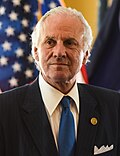 | Henry McMaster | Republican | January 24, 2017 | Elected at-large | 4 years, renewable once consecutively | |
| Lieutenant Governor of South Carolina |  | Pamela Evette | Republican | January 9, 2019 | Elected at-large in tandem with the governor | 4 years, no limit | |
| Attorney General of South Carolina |  | Alan Wilson | Republican | January 12, 2011 | Elected at-large | 4 years, no limit | |
| Commissioner of Agriculture |  | Hugh Weathers | Republican | September 14, 2004 | Elected at-large | 4 years, no limit | |
| Comptroller General |  | Brian J. Gaines | Democratic[1] | May 12, 2023[a] | Elected at-large | 4 years, no limit | |
| Secretary of State | 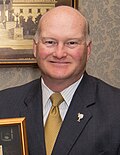 | Mark Hammond | Republican | January 15, 2003 | Elected at-large | 4 years, no limit | |
| Treasurer |  | Curtis Loftis | Republican | January 12, 2011 | Elected at-large | 4 years, no limit | |
| South Carolina Superintendent of Education |  | Ellen Weaver | Republican | January 11, 2023 | Elected at-large | 4 years, no limit | |
Each officer is elected at the same time as the governor. The separately elected positions allow for the possibility of multiple parties to be represented in the executive branch. The Governor’s Cabinet also contains several appointed positions. In most cases, persons who fill cabinet-level positions are recommended by the governor and appointed by the Senate.[2]
Legislative branch
The South Carolina General Assembly is the state legislature. It is bicameral, consisting of a 124-member South Carolina House of Representatives and a 46-member South Carolina Senate. Representatives serve two-year terms and Senators serve four-year terms. The two houses meet in the South Carolina State House. Each house is currently controlled by the Republican Party.
Originally, each county elected one senator and at least one representative. The vast differences between rural and urban counties gave rural areas an outsized influence over state government. This state of affairs ended with the federal case of Reynolds v. Sims, which mandated that state legislative districts be drawn based on population, and that that counties’ representation must be roughly equal.
Historic Party Control
Below is a chart of party control in the South Carolina General Assembly since 1868.

Judicial branch
The Family Court deals with all matters of domestic and family relationships, as well as generally maintaining exclusive jurisdiction over cases involving minors under the age of seventeen, excepting traffic and game law violations. Some criminal charges may come under Circuit Court jurisdiction.
The South Carolina Circuit Court is the trial court of general jurisdiction court for South Carolina. It consists of a civil division (the Court of Common Pleas) and a criminal division. (the Court of General Sessions). It is also a superior court, having limited appellate jurisdiction over appeals from the lower Probate Court, Magistrate’s Court, and Municipal Court, and appeals from the Administrative Law Judge Division, which hears matters relating to state administrative and regulatory agencies. South Carolina’s 46 counties are divided into 16 judicial circuits, and there are currently 46 judges. Circuit court judges are elected by the General Assembly to six-year terms.
The South Carolina Court of Appeals is the state intermediate appellate court. It hears all Circuit Court and Family Court appeals, excepting appeals that are within the seven classes of exclusive Supreme Court jurisdiction. The Court of Appeals is selected by the General Assembly to long six-year terms. The court comprises a chief judge, and eight associate judges, and may hear cases as the whole court, or as three panels with three judges each. The court may preside in any county.
The South Carolina Supreme Court is the state supreme court. The Chief Justice and four Associate Justices are elected to staggered ten-year terms. There are no limits on the number of terms a justice may serve, but there is a mandatory retirement age of 72. The overwhelming majority of vacancies on the Court occur when Justices reach this age, not through the refusal of the General Assembly to elect a sitting Justice to another term.
Law
South Carolina Constitution
South Carolina has had seven constitutions:
- 1776: SC’s first constitution
- 1778: Disestablished the Anglican Church, created a popularly elected upper house
- 1790: Expanded upcountry representation, further established General Assembly control over all aspects of government
- 1861: Confederate constitution
- 1865: Required to be readmitted to the Union, abolished property owning qualifications to vote, created popularly elected governor and granted veto power
- 1868: Only constitution to be ratified by popular vote, provided for public education, abolished property ownership as a qualification for office holding, created counties with home rule, abolished race as limit on male suffrage
- 1895: Effectively disenfranchised black voters, requiring poll taxes, and literacy tests, to register to vote. In 1900 African Americans were 58% of the state population.[3] This exclusion of blacks from the political system was largely enforced until after passage of the Voting Rights Act of 1965, which authorized federal oversight and enforcement of voter registration and elections to ensure citizens could exercise their constitutional rights.
Since 1895, many residents have called for a new Constitution, one that is not based on the politics of a post–Civil War population. Governor Mark Sanford called for constitutional reform in his 2008 State of the State speech. Several hundred amendments have been made to the 1895 Constitution (in 1966 there were 330 amendments). Amendments have been created to comply with federal acts, and for many other issues. The volume of amendments makes South Carolina’s constitution one of the longest in the nation.[4]
Law enforcement agencies
- South Carolina Department of Public Safety
- South Carolina Highway Patrol Division
- South Carolina State Transport Police Division
- South Carolina Bureau of Protective Services
- South Carolina Criminal Justice Academy
- South Carolina Department of Corrections
- SC Department of Corrections Training Academy
- SC Department of Corrections Tactical Teams (Rapid Response Team-S.O.R.T.-Sitcon)
- SC Department of Juvenile Justice
- South Carolina Department of Probation, Parole and Pardon Services
- South Carolina State Law Enforcement Division (SLED)
- South Carolina Department of Natural Resources
- South Carolina Climatology Department
- South Carolina Department of Alcohol and Other Drug Abuse Services
- South Carolina Department of Mental Health
Local government
Historically, local governments in South Carolina have been fairly weak. For the most part, until the 1830s, towns were controlled by districts. According to historian Tom Downey, “the movement for incorporation initiated with a desire to implant order on unruly elements…which growing villages seemed to attract all too frequently.”[5] The initial charters gave towns regulatory power which they used to “appoint constables, levy fines, and enact ordinances.”[5] But, town councils were largely unable to pay their expenses with funds raised by just their fine revenue. In the late 1830s, the General Assembly started allowing select towns to tax property within their corporate limits.
The 1867 constitution established home rule for counties.[6] This was changed under the 1895 Constitution, which made no provision for local government and effectively reduced counties to creatures of the state. Each county’s delegation to the General Assembly also doubled as its county council. Under this system, the state senator from each county exercised the most power.[7] Reynolds v. Sims required reapportionment according to the principle of “one man, one vote”, which resulted in legislative districts crossing county lines. However, it was not until 1973 that the constitution was amended to provide for limited home rule at the county level. The Home Rule Act in 1975 implemented this.[7] This law provided for elected councils in each county. Nonetheless, the legislature still devotes considerable time to local issues, and county legislative delegations still decide many matters that are handled at the county level in most other states.
Municipal governments may incorporate as cities or towns. However, there is no legal difference between the two.[8]
Compared to cities in neighboring states, South Carolina cities are fairly small in size and population, since state law makes annexation difficult.[9] To expand their borders, cities in South Carolina generally have three options when annexing contiguous land. First, if all property owners in a given area of land sign and file a petition with the municipality requesting annexation, the municipality may approve the petition and enact an ordinance declaring the annexation.[10] Second, 75% of the freeholders in an area owning 75% or more of the assessed property value in that area may file a petition for annexation which the municipality may approve.[11] More stringent petition requirements are added due to the lowered petitioner threshold.[12] Finally, 25% of electors in an area can file a petition to initiate an annexation election which in turn requires a majority of voters to approve the annexation.[13] This option previously required that 25% of freeholders file the petition for an election, but that was found to be a violation of the Equal Protection Clause.[9]
Federal and state representation
U.S. Senate
The current South Carolina delegation to the United States Senate:
| Portrait | Senator | Party | Since |
|---|---|---|---|
 | Lindsey Graham | Republican | January 3, 2003 |
 | Tim Scott | Republican | January 2, 2013 |
U.S. House of Representatives
South Carolina currently has seven representatives in the United States House of Representatives:
| Portrait | District | Representative | Party | Since |
|---|---|---|---|---|
 | District 1 | Nancy Mace | Republican | January 3, 2021 |
 | District 2 | Joe Wilson | Republican | December 18, 2001 |
 | District 3 | Sheri Biggs | Republican | January 3, 2025 |
 | District 4 | William Timmons | Republican | January 3, 2019 |
 | District 5 | Ralph Norman | Republican | June 26, 2017 |
 | District 6 | Jim Clyburn | Democratic | January 3, 1993 |
 | District 7 | Russell Fry | Republican | January 3, 2023 |
A district map is found here.
Judiciary
South Carolina is part of the United States District Court for the District of South Carolina in the federal judiciary. The district’s cases are appealed to the Richmond-based United States Court of Appeals for the Fourth Circuit.
Finances
The state does not allow casino gambling, but it authorized the operation of video poker machines throughout the state. This yielded revenue of approximately $2 billion per year deposited into the state’s coffers. But, in 2000 the legislature banned video poker, requiring machines to be shut off and removed from the state by July 8.[14][15]
Taxes
The state’s personal income tax has a maximum marginal tax rate of 7 percent on taxable income of $13,351 and above.[16]
State sales tax revenues are used exclusively for education. South Carolina has a 6% state sales tax, but when combined with local and county taxes, South Carolina has the second-highest sales tax in the United States next to California. In Charleston, South Carolina, the tax rates equals 10.5% with state tax, county tax, local option tax, and the hospitality tax. Some items have different rates; e.g., the tax is 3% on unprepared food items and 7% on sleeping accommodation rentals. Individuals 85 or older get a one-percent exclusion from the general sales tax.[17] Counties may impose an additional 1% local option sales tax and other local sales taxes,[18] and local governments may impose a local accommodations tax of up to 3%.[17]
South Carolina imposes a casual excise tax of 5% on the fair market value of all motor vehicles, motorcycles, boats, motors and airplanes transferred between individuals. The maximum casual excise tax is $500.[18][19]
Property tax is administered and collected by local governments with assistance from the South Carolina Department of Revenue. Both real and personal property are subject to tax. Approximately two-thirds of county-levied property taxes are used for the support of public education. Municipalities levy a tax on property situated within the limits of the municipality for services provided by the municipality. The tax is paid by individuals, corporations and partnerships owning property within the state. Intangible personal property is exempt from taxation. There is no inheritance tax.[20]
Presidential elections through history
| Year | Republican | Democratic | Third party(ies) | |||
|---|---|---|---|---|---|---|
| No. | % | No. | % | No. | % | |
| 1868 | 62,301 | 57.93% | 45,237 | 42.07% | 0 | 0.00% |
| 1872 | 72,290 | 75.73% | 22,699 | 23.78% | 463 | 0.49% |
| 1876 | 91,786 | 50.24% | 90,897 | 49.76% | 0 | 0.00% |
| 1880 | 57,954 | 34.13% | 111,236 | 65.51% | 603 | 0.36% |
| 1884 | 21,730 | 23.41% | 69,845 | 75.25% | 1,237 | 1.33% |
| 1888 | 13,736 | 17.17% | 65,824 | 82.28% | 437 | 0.55% |
| 1892 | 13,345 | 18.93% | 54,680 | 77.56% | 2,479 | 3.52% |
| 1896 | 9,313 | 13.51% | 58,801 | 85.30% | 824 | 1.20% |
| 1900 | 3,579 | 7.04% | 47,233 | 92.96% | 0 | 0.00% |
| 1904 | 2,554 | 4.63% | 52,563 | 95.36% | 1 | 0.00% |
| 1908 | 3,945 | 5.94% | 62,288 | 93.84% | 146 | 0.22% |
| 1912 | 536 | 1.06% | 48,357 | 95.94% | 1,512 | 3.00% |
| 1916 | 1,550 | 2.42% | 61,846 | 96.71% | 556 | 0.87% |
| 1920 | 2,610 | 3.91% | 64,170 | 96.05% | 28 | 0.04% |
| 1924 | 1,123 | 2.21% | 49,008 | 96.56% | 621 | 1.22% |
| 1928 | 5,858 | 8.54% | 62,700 | 91.39% | 47 | 0.07% |
| 1932 | 1,978 | 1.89% | 102,347 | 98.03% | 82 | 0.08% |
| 1936 | 1,646 | 1.43% | 113,791 | 98.57% | 0 | 0.00% |
| 1940 | 4,360 | 4.37% | 95,470 | 95.63% | 2 | 0.00% |
| 1944 | 4,610 | 4.46% | 90,601 | 87.64% | 8,164 | 7.90% |
| 1948 | 5,386 | 3.78% | 34,423 | 24.14% | 102,762 | 72.08% |
| 1952 | 168,082 | 49.28% | 173,004 | 50.72% | 0 | 0.00% |
| 1956 | 75,700 | 25.18% | 136,372 | 45.37% | 88,511 | 29.45% |
| 1960 | 188,558 | 48.76% | 198,129 | 51.24% | 1 | 0.00% |
| 1964 | 309,048 | 58.89% | 215,700 | 41.10% | 8 | 0.00% |
| 1968 | 254,062 | 38.09% | 197,486 | 29.61% | 215,434 | 32.30% |
| 1972 | 478,427 | 70.58% | 189,270 | 27.92% | 10,183 | 1.50% |
| 1976 | 346,140 | 43.13% | 450,825 | 56.17% | 5,629 | 0.70% |
| 1980 | 441,207 | 49.57% | 427,560 | 48.04% | 21,316 | 2.39% |
| 1984 | 615,539 | 63.55% | 344,470 | 35.57% | 8,531 | 0.88% |
| 1988 | 606,443 | 61.50% | 370,554 | 37.58% | 9,012 | 0.91% |
| 1992 | 577,507 | 48.02% | 479,514 | 39.88% | 145,506 | 12.10% |
| 1996 | 573,458 | 49.89% | 504,051 | 43.85% | 71,948 | 6.26% |
| 2000 | 786,426 | 56.83% | 566,039 | 40.91% | 31,312 | 2.26% |
| 2004 | 937,974 | 57.98% | 661,699 | 40.90% | 18,057 | 1.12% |
| 2008 | 1,034,896 | 53.87% | 862,449 | 44.90% | 23,624 | 1.23% |
| 2012 | 1,071,645 | 54.56% | 865,941 | 44.09% | 26,532 | 1.35% |
| 2016 | 1,155,389 | 54.94% | 855,373 | 40.67% | 92,265 | 4.39% |
| 2020 | 1,385,103 | 55.11% | 1,091,541 | 43.43% | 36,685 | 1.46% |
| 2024 | 1,483,747 | 58.23% | 1,028,452 | 40.36% | 35,941 | 1.41% |
Notes
- ^ Gaines was appointed by the governor as a recess appointment following the resignation of Richard Eckstrom.
- ^ This chart denotes which presidential candidate received South Carolina’s electoral votes in each election. Victors are marked with checks and losers with “x”.
References
- ^ Folks, Will. “South Carolina Democrats Finally ‘Win’ A Statewide Office”. FITSNews. Retrieved 21 May 2023.
- ^ “South Carolina SC – Elected State Government Officials, E-mail Addresses”. Sciway.net. Retrieved July 31, 2010.
- ^ Historical Census Browser, 1900 US Census, University of Virginia (Archived 2007-08-23 at the Wayback Machine). Retrieved March 15, 2008.
- ^ “Constitutions”, The South Carolina Encyclopedia, Walter Edgar, University of South Carolina Press
- ^ a b Downey, Thomas More. Planting a capitalist south : the transformation of western South Carolina, 1790-1860. p. 169. OCLC 46403540.
- ^ Charlie B. Tyler, “The South Carolina Governance Project”, Appendix 5, University of South Carolina, 1998, p. 221
- ^ a b Tyler (1998), “The South Carolina Governance Project”], p. 222
- ^ Section 5-7-20 Archived 2009-04-01 at the Wayback Machine of the South Carolina Code of Laws. “The corporate name of every city or town incorporated under this title shall be ‘the city of “__________” ‘ or ‘the town of “__________” ‘.“
- ^ a b Wesley E. Henderson, Note, Annexation in South Carolina, 17 S.E. Envtl. L.J. 235, 244 (2003).
- ^ S.C. Code Ann. § 5-3-150(3).
- ^ S.C. Code Ann. § 5-3-150(1).
- ^ See id. (additional petition requirements include requiring the petition be open on demand to those affected by the potential annexation and requiring the municipality to give notice of a public hearing).
- ^ S.C. Code Ann. § 5-3-300.
- ^ “Video Poker Outlawed In South Carolina”.
- ^ Statement by the South Carolina Law Enforcement Division regarding the change of Video Poker Machine Laws (In PDF Format)
- ^ South Carolina Personal income tax, Bankrate.com, February 4, 2009. Retrieved March 15, 2009.
- ^ a b Sales and Use Tax Seminar Manual 2007, South Carolina Department of Revenue, January 2007. Retrieved March 15, 2009.
- ^ a b A General Guide To South Carolina Sales and Use Tax, South Carolina Department of Revenue, October 12, 2007. Retrieved March 15, 2009.
- ^ “Code of Laws – Title 12 – Chapter 36 – South Carolina Sales And Use Tax Act”. www.scstatehouse.gov. Retrieved 2019-10-23.
- ^ South Carolina Inheritance and estate taxes, Bankrate.com, February 4, 2009. Retrieved March 15, 2009.
- ^ Leip, David. “Presidential General Election Results Comparison – South Carolina”. US Election Atlas. Retrieved October 27, 2022.
